SUMMARY
This is AI generated summarization, which may have errors. For context, always refer to the full article.
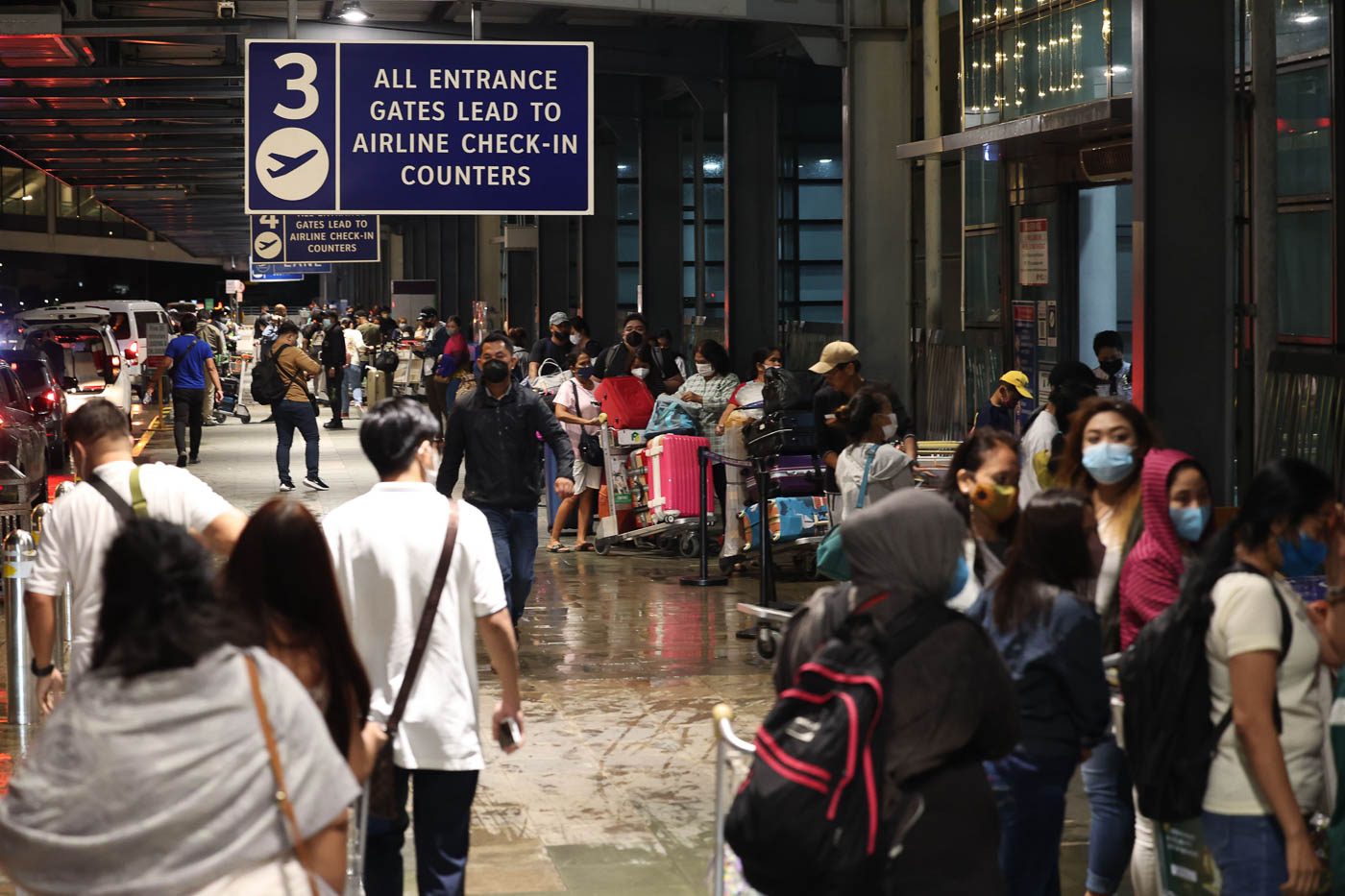
MANILA, Philippines – Filipinos who were trafficked by a Chinese mafia to take part in cryptocurrency scams in Myanmar were instructed to pay P10,000 to P20,000 ($175 to $349) to Philippine immigration to let them leave the country with fake documents, a trafficked victim said on Tuesday, November 22.
In a Tuesday press briefing with Senator Risa Hontiveros, who on Monday, November 21, revealed the scheme in a privilege speech, a trafficked survivor only known as “Rita” revealed details of how she and other Filipinos were lured out of the country through job offers on social media to be call center agents in Thailand.
“Ang gagawin daw po, ang instruction nila, paghingi ng passport [dapat magbigay] ng P10,000 to P20,000…. Pero before that po, kung wala pong trabaho ‘yung papunta po doon, pinapagawan po ng mga fake documents,” said Rita.
(The instructions given to us was, when they ask for our passports, we must also give them P10,000 to P20,000… But before that, if we didn’t have jobs in Thailand, we were made to prepare fake documents.)
It was unclear whether the traffickers shouldered the alleged bribes or the OFWs paid out of their own pockets.
Rita said her traffickers advised her and other Filipinos that they would be processed a visa, only to be issued a tourist visa, and not a work visa. Fake documents Rita mentioned included an employment certificate.
She said she and other Filipinos who were trafficked came from Terminal 3 of the Ninoy Aquino International Airport. They left for Thailand on July 28, and Rita went through four months of being trapped in the scam in Myanmar.
Twelve Filipinos were rescued from Myanmar by a network of nongovernmental organizations. Hontiveros said there are an estimated 31 OFWs who are still stuck in the scam.
Hontiveros noted how Philippine immigration officers also accepted P10,000 to let Chinese employees of Philippine offshore gaming operators seamlessly enter the country in what was called the “pastillas” scam. (READ: ‘Magkano at hanggang kanino?’: Hontiveros reveals bribery in entry of POGO workers)
In June, the Office of the Ombudsman charged 43 people, including Bureau of Immigration (BI) officials, with graft in connection with the pastillas scam.
“Nananawagan din ako sa DOJ (Department of Justice) na imbestigahan kung may mga kasabwat ang mga sindikatong ito. Sino ang natitira pagkatapos ng inanunsyong paglinis halimbawa sa BI? Sinong natitira [na] nagbibigay ng go signal para palusutin ang mga Pilipino? …. Paano sila nakalusot sa ating borders?” said Hontiveros on Tuesday.
(I am also calling on the DOJ to investigate if there are accomplices in this syndicate. Who was left behind after the announced cleansing of the BI? Who was left to give go signals to let Filipinos slip through? How do they slip through our borders?)
Driver after driver, hours in the wilderness
On Tuesday, joining Hontiveros’ press conference via Zoom, Rita recalled the hours of confusing travel she and her companions went through when they arrived in Thailand.
Rita said they rode a bus to a hotel, but another driver came to pick them up less than an hour later. This new driver showed pictures of them which they suspected were provided by their recruiter. Rita called up the recruiter, who then confirmed that they should go with the new driver for a “three-hour” ride.
But the ride lasted up to seven to eight hours, Rita said, and the Filipinos had no idea where they were because they did not have access to the internet. The recruiter told them not to buy SIM cards because these would be sponsored by the company.
“So, ‘yung mga panahong ‘yun, wala kaming malapitan, kasi wala kaming internet, at ‘yung driver ko, ‘di naman nakakaintindi. So, samakatuwid po, wala kaming magagawa kundi sumunod sa binibigay sa ‘ming instructions,” said Rita.
(So, during that time, we had no one to approach, because we did not have internet, and the driver could not understand us. So we couldn’t do anything but follow the instructions given to us.)
After the hours-long drive, they were again taken to a resort to rest for less than an hour before another driver came to pick them up. This driver had photos of them, too.
“[After] less than an hour po, dumating po kami doon sa masukal ‘yung dinaanan namin. Masukal, matalahib, madilim. Kahit po ‘yung sasakyan namin, nakapatay ‘yung ilaw, kaya natatakot na po kami no’n. Hindi na rin namin alam ano na bang nangyayari, bakit ang dilim, bakit hindi binubuksan ‘yung ilaw. Which is wala naman kaming magawa kasi ‘di naman namin sila makausap,” said Rita.
(After less than an hour, we arrived at a sketchy place. It was dense, bushy, and dark. Even our vehicle’s lights were switched off, which is why we were scared. We didn’t know what was happening – why it was so dark, why they weren’t switching on the lights. We couldn’t do anything because we couldn’t talk to them.)
The Filipinos held onto each other as they encountered an armed man in this new place. They were instructed to walk down to a river, move in a duck position, and were told to keep quiet and not turn on any flashlights.
“There were so many thoughts in our minds. We didn’t know how to move forward. But because our lives were at stake, we just followed what they said. We just trusted that, okay, let’s just follow them because we didn’t have a choice,” Rita said in Filipino.
They later boarded a boat that brought them to the other side of the river. “Pagtawid po namin sa kabilang parte, hindi po namin alam na Myanmar na po ‘yun doon (When we got to the other side, we didn’t know that that was already Myanmar),” Rita said.
The Filipino group was eventually brought to company headquarters, where their minds were put to ease as there were buildings and lights around. Chinese people met with them and asked if they had eaten, but all the Filipinos wanted was an internet connection.
This was the beginning of months of forced participation in the cryptocurrency scam, where the Filipinos befriended victims and convinced them to make investments that the victims would no longer be able to access later on. The Filipinos were abused if they failed to scam people.
Hontiveros earlier said that the scammers operated inside the Shwe Kokko Special Economic Zone, also known as Yatai New City, in Myanmar.
The Department of Migrant Workers (DMW) said on Tuesday that it was coordinating with Hontiveros’ office as well as the Department of Foreign Affairs, and that it was assisting OFWs who survived the scam and were able to go home.
DMW Undersecretary Hans Cacdac said in a Laging Handa briefing that Secretary Susan Ople had ordered various forms of assistance to the trafficked OFWs, such as accommodations, legal and financial assistance, and psychosocial counseling. – Rappler.com
USD $1 = P57.375
Add a comment
How does this make you feel?
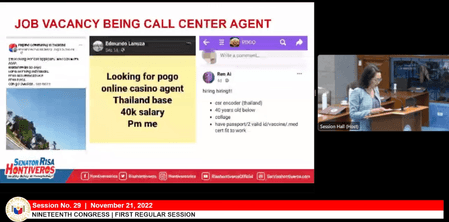




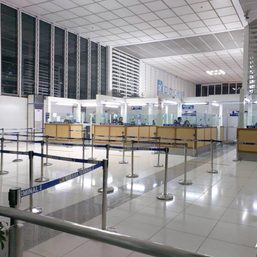

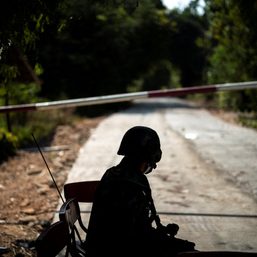
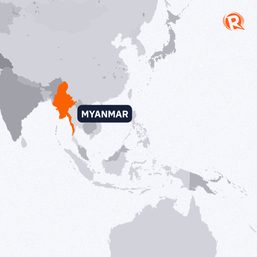

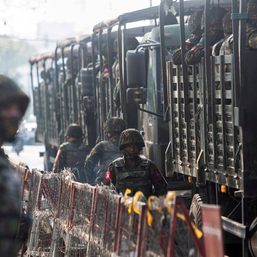




![[Finterest] Financial and travel scams to watch out for this Holy Week 2024](https://www.rappler.com/tachyon/2024/01/priest-scammed-january-27-2024.jpg?resize=257%2C257&crop=395px%2C0px%2C1080px%2C1080px)





There are no comments yet. Add your comment to start the conversation.